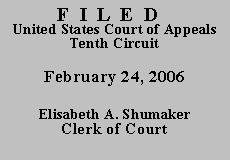

| LYNDA M. FRATIS,
Plaintiff-Appellant, v. BILL OWENS; JOE ORTIZ; STEVE ROSSI; STEVE HAGER; CHERRIE GRECCO, Warden, Defendants-Appellees. |
|
Lynda M. Fratis and Renee Polreis, prisoners of the State of Colorado appearing pro se, filed this suit under 42 U.S.C. § 1983, alleging that their constitutional rights are and will be violated by a plan of the State of Colorado to convert the sole Level II women's facility to a different purpose and move all of the women to a new, higher-level facility. They alleged that they will be unable to progress to Level II and Level I facilities simply because they are women, while male inmates can make that progression because there are facilities for them at each security level. Plaintiffs also moved for a preliminary injunction to prevent the State of Colorado from closing the current Level II women's facility.
The district court denied the motion for a preliminary injunction because plaintiffs did not show that they have a constitutionally-protected liberty interest in their classification or placement. The court directed plaintiffs to file an amended complaint to cure pleading defects and demonstrate administrative exhaustion. Because Ms. Polreis did not do so, the court dismissed her from the suit for failure to prosecute, and she is not a party to these appeals. Ms. Fratis did filed an amended complaint, but the court dismissed her suit for failure to exhaust administrative remedies.
In No. 05-1054, Ms. Fratis appeals from the district court's denial of a preliminary injunction. We review this decision for an abuse of discretion. Dominion Video Satellite, Inc. v. EchoStar Satellite Corp., 269 F.3d 1149, 1153 (10th Cir. 2001). We have reviewed the record and appellant's brief on appeal. We conclude that there is no abuse of discretion, and affirm the denial of a preliminary injunction for substantially the same reasons as those stated by the district court in its January 7, 2005 order.
In No. 05-1135, Ms. Fratis appeals from the district court's dismissal of her suit for failure to exhaust the three-step administrative grievance procedure. Appellant actually filed paperwork for all three steps. But the district court noted that the prison's response to her step-three grievance was that she had not exhausted her administrative remedies because the Level II facility has not been closed and so her grievance was not based on an action that has occurred to her personally, as required by the regulation governing the grievance procedure. The court concluded that appellant had not exhausted her administrative remedies.
We review de novo the district court's dismissal for failure to exhaust. Fitzgerald v. Corr. Corp. of Am., 403 F.3d 1134, 1138 (10th Cir. 2005). Based on our review of appellant's brief, the record, and the applicable regulation, the district court's conclusion that Ms. Fratis failed to exhaust her administrative remedies was correct.
However, the district court did not specify whether its dismissal was with or without prejudice.(1) "[A] dismissal based on lack of exhaustion should ordinarily be without prejudice." Id. at 1139. "Under certain circumstances, a district court may, notwithstanding failure to exhaust, proceed to the merits of the claim and dismiss with prejudice if it concludes a party would be unsuccessful even absent the exhaustion issue." Id. Therefore "we vacate and remand for the court below to either modify its opinion to specify that the dismissal is without prejudice, or make a determination on the merits within its permissible scope to do so under 42 U.S.C. § 1997e(c)(2)." Id. at 1140.
In No. 05-1054, the judgment of the district court is AFFIRMED. In No. 05-1135, the judgment of the district court is VACATED and the case is REMANDED for clarification whether its dismissal is with or without prejudice.
Entered for the Court
Circuit Judge
*. This order and judgment is not binding precedent, except under the doctrines of law of the case, res judicata, and collateral estoppel. The court generally disfavors the citation of orders and judgments; nevertheless, an order and judgment may be cited under the terms and conditions of 10th Cir. R. 36.3.
1. We also note that the district court incorrectly filed an "order and judgment of dismissal" instead of entering its judgment on a separate document under Fed. R. Civ. P. 58(a)(1). See, e.g., Clymore v. United States, 415 F.3d 1113, 1117 & n.5 (10th Cir. 2005).